Joan Blencowe

It is with the deepest sadness that I have to inform the Association of the death of Joan Blencowe on 1st April. If you attended the Reunion at Blencowe last summer you will not fail to remember the statuesque figure darting hither and thither, hanging precariously from high stone walls to ascertain the best angle for our group photos.
Joan fought a courageous battle against breast cancer some years ago but it returned with a vengeance earlier this year and despite bravely embarking on treatment, sadly it overwhelmed her.
Her funeral was held at Kirkheaton Church, near Huddersfield, where she regularly worshipped and was overflowing with devoted friends and colleagues. All paid tribute to her amazing sense of humour and fun, and the childlike quality which made life still a wondrous adventure for Joan. It was raining when we entered the Church but the sun sparkled when we came out.
Joan's final resting place is Laneside Cemetery, peacefully nestled amongst the hills and fields she loved so much.
Tricia Wales
Richard Blencowe
I am very sad to inform you of the death of our son, Richard at the age of 52 years, on the 11th January 2011. He was the second child of our six children. He is survived by his wife Nazila and their four children, Michael, Martin, Monty and Phoebe. Richard died at his home in Los Angeles but his wife brought him back to his English home, in Hove, East Sussex. His funeral took place at the Church of the Sacred Heart in Hove. He will be greatly missed by all who knew him.
Richard bravely fought cancer for five years. He was an extremely brave man who never complained and I believe he was an inspiration to the Doctors in America who treated him. Indeed, Richard was an inspiration to us all.
Angela Blencowe
Feedback on WHO ran the Blencowe Breweries after William (2) died in 1896.
Richard May obtained William's will. He left his five surviving daughters equal shares in William Blencowe & Co. Ltd. along with generous cash amounts. Some of the girl's husbands were managing or otherwise employed in the brewing business. By the 1911 Census, the families had moved 'Up' in life into large houses in wealthier areas e.g. High Wickham and Brighton and all their young children were in boarding school. Several husbands were no longer working.
It appears they entered the war years quite comfortably off. I speculate this didn't continue for long after it. Anne